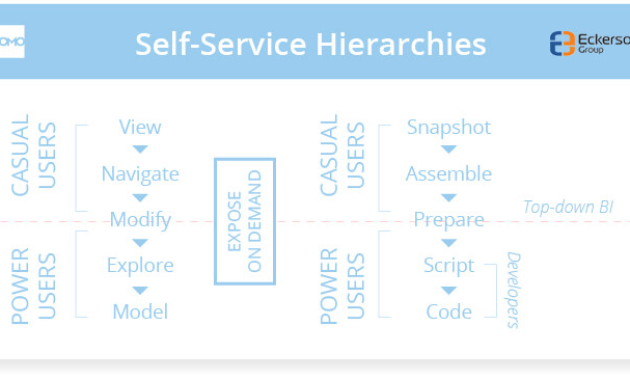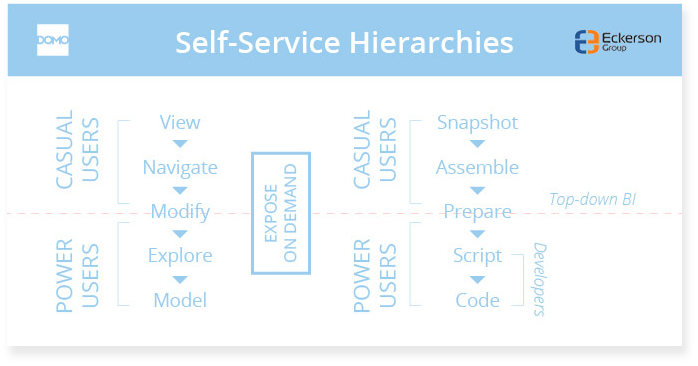
Self-Service Business Intelligence Software: Powering Innovation in the Modern Era
In today’s fast-paced business environment, data is the new currency. Companies are drowning in information, but the real challenge lies in extracting actionable insights. This is where self-service business intelligence (BI) software steps in, offering a powerful solution to unlock the potential hidden within your data. This article will explore how self-service business intelligence software drives innovation, transforming the way businesses operate and compete.
The ability to make data-driven decisions is no longer a luxury; it’s a necessity. Traditional BI tools often required specialized expertise, creating bottlenecks and hindering agility. Self-service BI software empowers business users, allowing them to analyze data, create reports, and generate insights without relying on IT departments or data scientists. This democratization of data empowers innovation and accelerates decision-making processes.
Understanding Self-Service Business Intelligence
Self-service business intelligence software is designed to be user-friendly and intuitive. It allows users with little to no technical background to access, analyze, and visualize data. This accessibility is a core feature. Key characteristics include:
- Intuitive Interface: Drag-and-drop functionality and user-friendly dashboards.
- Data Connectivity: Integration with various data sources, including databases, spreadsheets, and cloud platforms.
- Data Visualization: A wide range of charts, graphs, and maps to present data effectively.
- Reporting Capabilities: Tools to create and customize reports for specific business needs.
- Data Exploration: Features that allow users to drill down into data and uncover hidden patterns.
Unlike traditional BI, self-service BI software shifts the focus from IT-driven reporting to user-driven analysis. This shift creates a more agile and responsive environment, allowing businesses to quickly adapt to market changes and seize new opportunities. The emphasis is on empowering users to explore data and find insights that drive innovation.
The Role of Self-Service BI in Driving Innovation
Self-service business intelligence software is a catalyst for innovation across various business functions. By providing access to data and analytical tools, it empowers employees to identify opportunities, improve processes, and develop new products and services. Here’s how it fuels innovation:
Improved Decision-Making
Data-driven decisions are more accurate and effective. Self-service BI software enables users to make informed decisions based on real-time data. This leads to better outcomes and reduced risks. For example, a marketing team can analyze campaign performance data to optimize their strategies and improve ROI. A sales team can identify top-performing products and customer segments. This leads to more strategic sales efforts.
Enhanced Data Literacy
Self-service BI software promotes data literacy across the organization. As users become more familiar with data analysis and visualization, they develop a better understanding of their business. This improved data literacy fosters a culture of innovation. Employees become more proactive in identifying opportunities for improvement. They also become more adept at using data to solve problems.
Faster Time to Insights
Traditional BI processes can be time-consuming. Self-service BI software accelerates the process of data analysis. Users can quickly access data, create reports, and generate insights. This faster time to insights allows businesses to respond to market changes more quickly. It also allows them to capitalize on new opportunities. This agility is critical in today’s competitive landscape.
Empowering Business Users
Self-service BI software empowers business users. It eliminates the need for technical expertise. Users can analyze data and create reports without relying on IT or data scientists. This empowerment frees up IT resources. It also allows business users to take ownership of their data analysis. This leads to greater engagement and innovation.
Key Features to Look for in Self-Service BI Software
Choosing the right self-service BI software is critical to its success. Several key features should be considered:
- Ease of Use: The software should have an intuitive interface and drag-and-drop functionality.
- Data Connectivity: It should integrate with various data sources.
- Data Visualization: A wide range of visualization options are important.
- Reporting Capabilities: Customization options for reports are crucial.
- Collaboration Features: Sharing and collaborating on reports is important.
- Mobile Accessibility: Access data and reports on the go.
- Security Features: Data security and governance are essential.
Evaluating these features will help you choose the self-service BI software that best fits your business needs. Make sure it aligns with your data sources, user skills, and business goals.
Real-World Applications: How Self-Service BI Drives Innovation
The impact of self-service business intelligence software is evident in diverse industries. Here are a few examples:
Retail
Retailers use self-service BI software to analyze sales data, track inventory, and optimize pricing strategies. They can identify best-selling products and understand customer behavior. This allows them to personalize marketing efforts and improve customer satisfaction. Retailers are innovating by using data to improve the customer experience.
Healthcare
Healthcare providers use self-service BI software to analyze patient data, improve operational efficiency, and enhance patient care. They can track patient outcomes, identify areas for improvement, and optimize resource allocation. Healthcare organizations are innovating through data-driven insights into patient care.
Manufacturing
Manufacturers use self-service BI software to monitor production processes, track inventory levels, and improve supply chain efficiency. They can identify bottlenecks, optimize production schedules, and reduce costs. Manufacturers are innovating by using data to optimize their operations.
Financial Services
Financial institutions use self-service BI software to analyze customer behavior, manage risk, and improve compliance. They can identify fraudulent activities, personalize customer offers, and improve customer service. Financial services are innovating through data-driven insights into customer needs and risk management.
Implementing Self-Service BI: Best Practices
Successful implementation of self-service business intelligence software requires a strategic approach. Here are some best practices:
- Define Clear Objectives: Identify specific business goals and use cases.
- Choose the Right Software: Select software that meets your needs.
- Provide Training: Train users on how to use the software.
- Establish Data Governance: Implement data governance policies.
- Promote Data Literacy: Foster a culture of data-driven decision-making.
- Monitor and Evaluate: Track the software’s impact.
By following these best practices, businesses can maximize the benefits of self-service BI software and drive innovation.
The Future of Self-Service BI and Innovation
The future of self-service business intelligence software is bright. Advancements in artificial intelligence (AI) and machine learning (ML) are further enhancing its capabilities. AI-powered BI tools can automate data analysis. They can also provide predictive insights. This will enable businesses to make even more informed decisions. The integration of AI and ML will continue to fuel innovation. This will lead to new ways of analyzing data and generating insights. [See also: The Impact of AI on Business Intelligence]
The trend toward cloud-based BI solutions is also growing. Cloud-based solutions offer greater scalability and flexibility. They also provide easier access to data and analytical tools. This will further democratize data analysis and empower business users. The cloud will continue to play a significant role in the evolution of self-service BI software. [See also: Cloud Computing and Data Analytics]
As businesses strive for a competitive edge, self-service business intelligence software will remain a vital tool. It will be a critical component of innovation. The ability to harness the power of data will be key to success. Embracing self-service BI software is not just an option. It is a strategic imperative for businesses looking to thrive in the digital age.
In conclusion, self-service business intelligence software is a powerful engine for driving innovation. By empowering business users, accelerating time to insights, and promoting data literacy, it transforms the way businesses operate. As technology continues to evolve, self-service BI software will become even more essential for businesses. They must embrace this technology to stay competitive.

